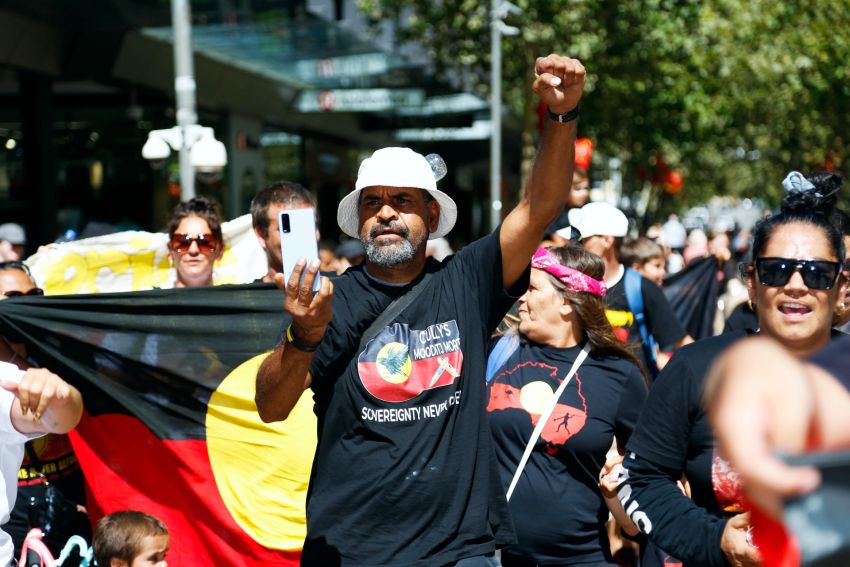
The Voice to Parliament bill passed the Senate 52–19 on June 19 and Australians will vote on enshrining a Voice in the Constitution in the next six months.
A handful of Coalition MPs voted against the Constitution Alteration (Aboriginal and Torres Strait Islander Voice) 2023 bill, as did Pauline Hanson's One Nation Party, the United Australia Party and independent Djab Wurrung, Gunnai and Gunditjmara Senator Lidia Thorpe.
The bill passed the House of Representatives on May 31, 121–25, with Liberal leader Peter Dutton voting in favour.
The referendum will ask whether or not Australians want an Aboriginal and Torres Strait Islander Voice to be added to the Constitution — one of the reforms proposed by the 2017 Uluru Statement from the Heart.
Minister for Indigenous Australians Linda Burney said the vote took the country “one step closer” to acknowledging Indigenous Australians in the Constitution and added, “Today the political debate ends”.
On the same day Yamatji Noongar woman and Greens Senator Derinda Cox tweeted: “Our work as parliamentarians is done, it’s over to the grassroots Yes campaigners now.”
A motion by Cox and co-signed by Northern Territory Labor Senator Malarndirri McCarthy the same day noted the Senate “endorses the implementation of the Uluru Statement from the Heart in full”.
Further, it said “all members of the Constitutional Expert Group have agreed that the proposed alteration to the Constitution ‘would not affect the sovereignty of any group or body’”. It passed by a much narrower margin: 32–29.
Cox said before the Greens committed to support the Voice to Parliament, the party pushed for “assurances that First Nations Sovereignty would not be impacted through the referendum process”.
She said the joint motion with Labor “confirmed” that, after the Voice referendum, there would be “further reforms that progress First Nations self-determination with Truth and Treaty in this term”.
“This must be the start of significant reforms working towards truth-telling and treaty-making,” she added.
Liberal Senator Richard Colbeck unsuccessfully moved to strike out the Voice’s ability to “make representations to the Parliament” on issues affecting Aboriginal and Torres Strait Islander peoples.
Thorpe unsuccessfully moved an amendment to insert that sovereignty of Aboriginal and Torres Strait Islander peoples had never been ceded.
It read in part: “The Sovereignty of Aboriginal and Torres Strait Islander peoples means an unceded right held in collective possession by the members of Aboriginal and Torres Strait Islander nations which confers usage, access and custodianship to the lands, waters, minerals and natural resources of what is now known as Australia, and the right of Aboriginal and Torres Strait Islander peoples to exercise an unimpeded and collective self‑determinate [sic] governance over their political, economic and social affairs”.
Thorpe hosted a lengthy media conference at Parliament House on June 20 to explain her opposition to the Voice and the referendum.
She was accompanied by several First Nations leaders, including Michael Mansell from the Tasmanian Aboriginal Centre, Wiradjuri woman Jenny Munro, Yawarllaayi/Gomeroi elder Barbara Flick, Yoorgabilya woman from the Whadjuk Noongar Nation Marianne Yoorgabilya Mackay and Wangan and Jagalingou cultural leader Adrian Burragubba. They spoke about the limits of the Voice in dealing with current injustices and their lack of consent as sovereign people. (SBS had published it in full on its website, but it has since been removed.)
“Our sovereignty does not coexist with the sovereignty of the Crown,” Thorpe said. “We are the original and only sovereign of these lands.”
Thorpe also said she had been negotiating with the government to include recommendations from the 1991 Royal Commission into Aboriginal Deaths in Custody and the 1997 Bringing them Home report into the over-representation of Aboriginal and Torres Strait Islander children in out-of-home care.
“The government have made up all the excuses as to why they can’t do that, so they didn’t come good. They could have shown good faith at least to save people’s lives here and now and they haven't done that,” Thorpe told the ABC on June 20.
Thorpe told Parliament: “I'll be voting no to this disastrous idea of giving us no power. If this bill gave us power then I would have thought about supporting it, but I can't support something that gives my people no power.”
Attorney General Mark Dreyfus announced on June 21, that First Nations deaths in custody would be reported “in real time”. He told SBS that such reporting “enables greater public transparency of deaths in custody and accountability of all governments for their criminal justice systems”.
Mackay said on her social media on June 21 she joined Thorpe because she wanted to make her views on the Voice known. “A lot of people have questions about the Voice to parliament … it is simply another advisory body that has no power to force government to listen to what we say … The wording of the Voice says ‘may make’ representations to government…”
The referendum question will be: “A Proposed Law: to alter the Constitution to recognise the First Peoples of Australia by establishing an Aboriginal and Torres Strait Islander Voice.
“Do you approve this proposed alteration?”
The Australian Electoral Commission has set up a website answering questions about the referendum and the Constitution.